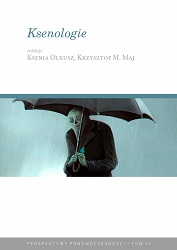Post-chrześcijańska dystopia albo proto-chrześcijańska utopia. O potrzebie mitologii w "MaddAddam" Margaret Atwood
Post-Christian Dystopia or Proto-Christian Utopia: On Human Necessity of Mythologies in Margaret Atwood’s "MaddAddam"
Author(s): Sławomir Kuźnicki
Subject(s): Politics / Political Sciences, Social Sciences, Language and Literature Studies, Studies of Literature
Published by: Ośrodek Badawczy Facta Ficta
Keywords: utopia;dystopia;mythology;religion;civilization;Bible;Margaret Atwood
Summary/Abstract: The chapter investigates Margaret Atwood’s “MaddAddam” (2013) in the context of religious mythologies as the crucial background in the process of civilization foundation. Religion—mainly in the form of Christian dogmas and beliefs—constitutes here a means rather than an end itself: it becomes a source of mythologies that enable the characters to understand the surrounding post-catastrophe reality. It also makes it possible to build a new civilisation on the ruins of the past one. Since “MaddAddam” focuses on the scientifically generated humanoids, the Crakers—and their endeavours to build their own culture—this urge for mythologies reflects the Crakers’ growing cultural awareness. What we can see in MaddAddam is the post-apocalyptic society with the reinterpreted Christianity in its centre, as these are the religion-based mythologies that constitute the momentum of the new civilisation and force us to reconsider religion’s impact on our culture in broader terms. It also seems interesting to approach the notion of post-Christian mythologies in “MaddAddam” in the context of their intersection with the utopia–dystopia dichotomy. On the one hand, there is a utopian realisation of the concept of a paradise on earth as one group of survivors, namely the Crakers, are at the beginning of the process of creating their own civilisation. On the other, the post-apocalyptic world constitutes a nightmarish dystopia for the few remaining representatives of old humanity because, as they correctly realize, it is the actual end of their civilization. What both cements and influences these two approaches is religion and the basic cultural processes it triggers.
Book: Ksenologie
- Page Range: 345-360
- Page Count: 16
- Publication Year: 2018
- Language: Polish
- Content File-PDF

